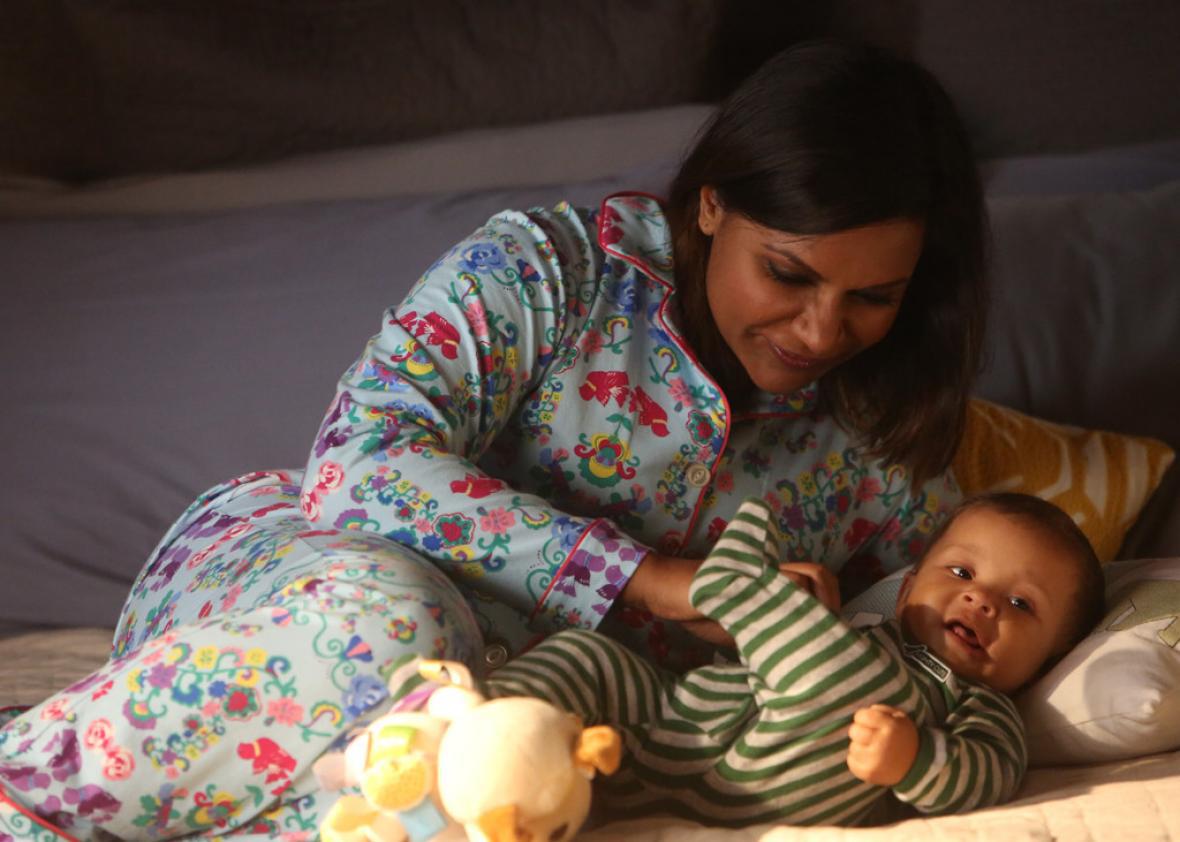On a recent episode of The Mindy Project, a newly-single Mindy returns from a successful date. “See?” says Morgan, whom she has entrusted with Leo, her infant son. “It’s not impossible to date as a single mother.” “Oh my God!” Mindy says, panic spreading across her face. “I’m a mom!”
This memory lapse encapsulates the attitude that Mindy—the character, as well as Mindy Kaling, her creator—has espoused about motherhood for the show’s entire fourth season. Leo’s arrival has brought with it a major character addition, and Kaling’s treatment of Mindy Lahiri as a new parent has been equal parts glib, sociopathic, indulgent, horrible, and charming. Just like Mindy herself. It’s also perfectly emblematic of a certain conception of motherhood, one popular with smart, ambitious, driven, educated, well-off people in their 20s and early 30s who have one thing in common: They have no children. In other words, this season of The Mindy Project feels exactly what someone with no kids but lots of ideas about having kids would imagine having kids to be like.
Kaling’s portrayal of Mindy as a mother is not inaccurate per se. Every mother’s experience is different, and there could very well be a real person out there who waltzed home from the hospital two days postpartum in full makeup and at regular human speed, wearing pre-pregnancy clothes, pushing a stroller like she wasn’t afraid it was made entirely of Fabergé eggs, in possession of a placid, noncrying infant who was miraculously born four months old.
Sure, it doesn’t really matter that Mindy’s portrayal of motherhood is inaccurate. What next, you might ask, an excursus on the many times in which Morgan Tookers should have lost his nursing license? A list of all of the things Mindy does that a real obstetrician would never condone, much less do herself? (Item 1: even think about conceiving a second baby when the first baby is four months old.) And yes, Leo Castellano is a classic ridiculous TV baby, who never explodes out of his diaper, stays asleep when he’s put to bed (in a crib far away, natch), breast- and bottle-feeds with no issues, and excels at sitting imperturbably in whatever conveyance he’s put into. But that’s cool, honestly.
What’s missing from Mindy’s transition into parenthood isn’t accuracy. It’s authenticity—which the rest of her show has in droves, even with its flights of absurdism. Despite Mindy’s retina-scorching fashion sense, eating habits of a truck driver in 1972, and low-level sociopathy, viewers relate to her (and her off-kilter supporting cast) because the intangibles of her struggles ring true: her professional ambitions and foibles; her loves and her loss; her implacable Faustian striving.
What the show is missing in its new plotline isn’t a hackneyed sitcom-style portrayal of the hardships of motherhood, with a chronically sleep-deprived Mindy covered in spit-up and three days’ flop sweat. Nor would it benefit from an Everybody-Loves-Raymond-esque portrayal of a beleaguered and largely sexless stay-at-home mom; that Mindy’s fertility practice and professional life remain important to her is a welcome portrayal on television.
But Kaling’s take on the Modern Mominista lacks the authenticity of new parenthood’s intangibles: the full self-transformation that often takes place when you bring a child into the world for the first time, a sort of mystical head-to-toe reorientation that can’t be described but is immediately recognizable—a dynamic that a comedy like Catastrophe, in contrast, has fully nailed.
Strangely enough, the closest The Mindy Project comes to registering this is in the eyes and carriage of the chauvinistic Danny, who keeps bursting into tears every time he looks at Mindy and the baby. It’s almost as if to counteract Danny’s patriarchal demands—he, another obstetrician, inexplicably also wants Mindy to get pregnant again mere months after giving birth—Mindy must not only resist sexist notions of motherhood’s transformational power but all notions of it.
Still, what Kaling and her writing staff don’t seem to recognize is that this isn’t generally a choice you can make. Whether you work or stay at home, new parenthood is usually a chaotic, utterly life- and self-changing state, in ways positive and negative. One’s new parent-self does not dissipate simply because the kid is with a sitter. New motherhood in particular clings to you like a sallow, ill-fitting second skin, wherever you are and whomever you’re with.
What Kaling has portrayed instead is a brilliant and absurdist version of the imaginary mother that many young women (including myself, once!) have entertained pre-child-rearing:
Maternity leave will be boring, and I’ll have nothing to do!
I’ll return to work!
… and sex like I used to have!
… and my old clothes! and leisurely meals!
But it turns out that when you become a parent, “just you” is gone, smithereens, an echo, like so much Cheetos dust in the bottom of a chartreuse purse.
I adore Mindy Kaling. I’ve seen every episode of her show, all her movies, read her books. But as much as I love The Mindy Project, Season 4 feels blithely unaware of the actual toll that the introduction of a miniature human takes on a woman’s life. So how to fix this? Fire baby Leo? How does one do that in any manner acceptable to a comedy? At the very least, Kaling might start with remembering that her character has a kid all the time—and that this remains true, even when the kid is napping serenely off camera.
